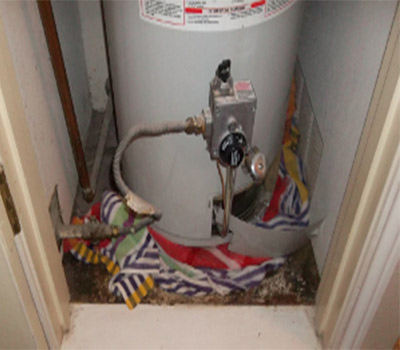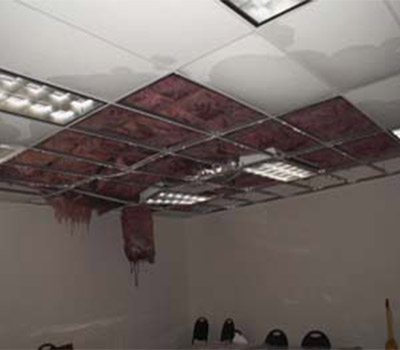Water Heater Overflow Cleanup

One of the more dangerous causes of indoor flooding is water heater overflows. Water heaters and boilers are usually located where people don’t go very often like in a basement, an attic, a garage or utility room closet. So, if a leak or a burst happens, it's likely that a tenant or home owner would not find the problem until after significant water intrusion has already occurred. When this happens, you’ll want to stay calm, shut off the heater and water and contact a Restoration Renegades contractor for professional help.
Restoration Renegades has the service provider that you’ll want to contact when you’ve got a water heater overflow. Your preferred company should have the knowledge, tools and experience to deal with the situation safely and effectively whether it’s your home or workplace that’s being threatened. We’ve got a nation-wide network of qualified companies across the United States who are ready to respond to your emergency.
First, easily locate a Restoration Renegades contractor near you using the "find a contractor" section at top of this page. Just select a service and enter your zip code. Then contact the nearest Restoration Renegades affiliated contractor from the list of contractors. Then an experienced and high quality restoration professional can do a full assessment of your water intrusion situation and give you the best recommendation and advice possible for addressing the problem.
Find Your Local “Restoration Renegades” Today
How Water Heater Overflows Happen
Water heater related flooding usually occurs from a leak in an older tank that has rusted through or has a worn out seal or gasket. Sometimes a tank can actually burst or explode. Bursts can be violent and very dangerous if anyone is unfortunate enough to be in the immediate vicinity of the water heater at the time of an explosion. Leaks are more common and have the potential to flood a basement or large portion of a home when undetected for days on end.

A water heater burst usually happens as a result of a malfunctioning thermostat. Thermostats are used to measure heat inside the tank to know when to turn the heating elements off and on so that a desired temperature range can be maintained. With a broken thermostat, a heating system isn’t able to correctly tell how hot or cold the water is inside the tank. The heating element could then stay on indefinitely which could cause the water inside the tank boil. As the water boils it turns into steam and builds up internal pressure. The pressure can build up to tens of thousands of pounds and eventually reach a point where the tank cannot hold the pressure, resulting in a burst or even explosion.
When a heater bursts, steam and boiling water rushes out of the tank while cold water from the intake line flows into the tank. Under normal conditions, the line will shut itself off, preventing water entry when the tank is full. However, since a burst tank continually leaks and is never full, the water from the main line flows in indefinitely. Water enters the tank only to leak out, which then floods the area around and below the water heater. The bright side to a burst is that there’s a good chance someone will hear it and investigate and discover the problem so action can be taken.
A leak, on the other hand, operates quietly and floods your basement or home little by little. It usually happens when one of your heating tank’s fittings gets corroded and is damaged. This can result in a gap that allows water to escape. This type of flooding is not violent like a burst tank, but it can be just as destructive to property and sometimes dangerous to human lives. Regular checkups and maintenance of your water heater will increase awareness of possible problems. A professional can flush the corrosion from your tank and replace the anode as well as check the thermostat and all the valves gaskets for problems or warning signs.
The Hazards of Water Heater Overflows
Because of the fact that water heater flooding has the added elements of high temperature and late detection, the number of threats that it creates exceeds that of normal flooding. Here’s a list of the things you have to watch out for when you have a water heater overflow:
- Hot water burns – The initial burst of water from a heater is scalding hot, so be sure not to rush in, especially if you see steam all over your basement. Put on protective clothing before attempting anything. Better yet, contact a Restoration Renegades company to do the job for you.
- Electrocution by water – A flooded basement carries the risk of having the water making contact with power outlets and exposed wiring. When this happens, the floodwater carries a strong electric current that’s enough to kill anyone. When you see your basement flooded, resist the impulse to dive into the water in an attempt to shut the leaking heater down. Contact a Restoration Renegades company for help. Their professionals will be able to tell whether there’s an electrical threat or not. They’ll know the safest procedure for shutting down the water source and containing and extracting the water from your property.
- Potential fire starter – Flooding doesn’t just create an electrical hazard, it can also short-circuit your electrical system and create sparks. Faulty electrical wiring is one of the most common causes of fire.
- Water damage – When the water spills beyond the immediate surroundings of the heater and gets into your living and work spaces, the threat of water damage arises. Water can ruin carpets, damage wood, corrode metals and toast expensive appliances and machinery.
- Mold growth – Mold spores can activate in places where there’s sufficient moisture and organic matter to sustain them. If your property was flooded by an overflowing heater, there’s a good chance that mold growth can follow suit. While seemingly harmless at first glance, mold can irritate our noses and skin when its spores are inhaled. Under certain conditions, mold colonies can turn black and toxic. The poison they produce has been linked to neurological disorders and even cancer.



